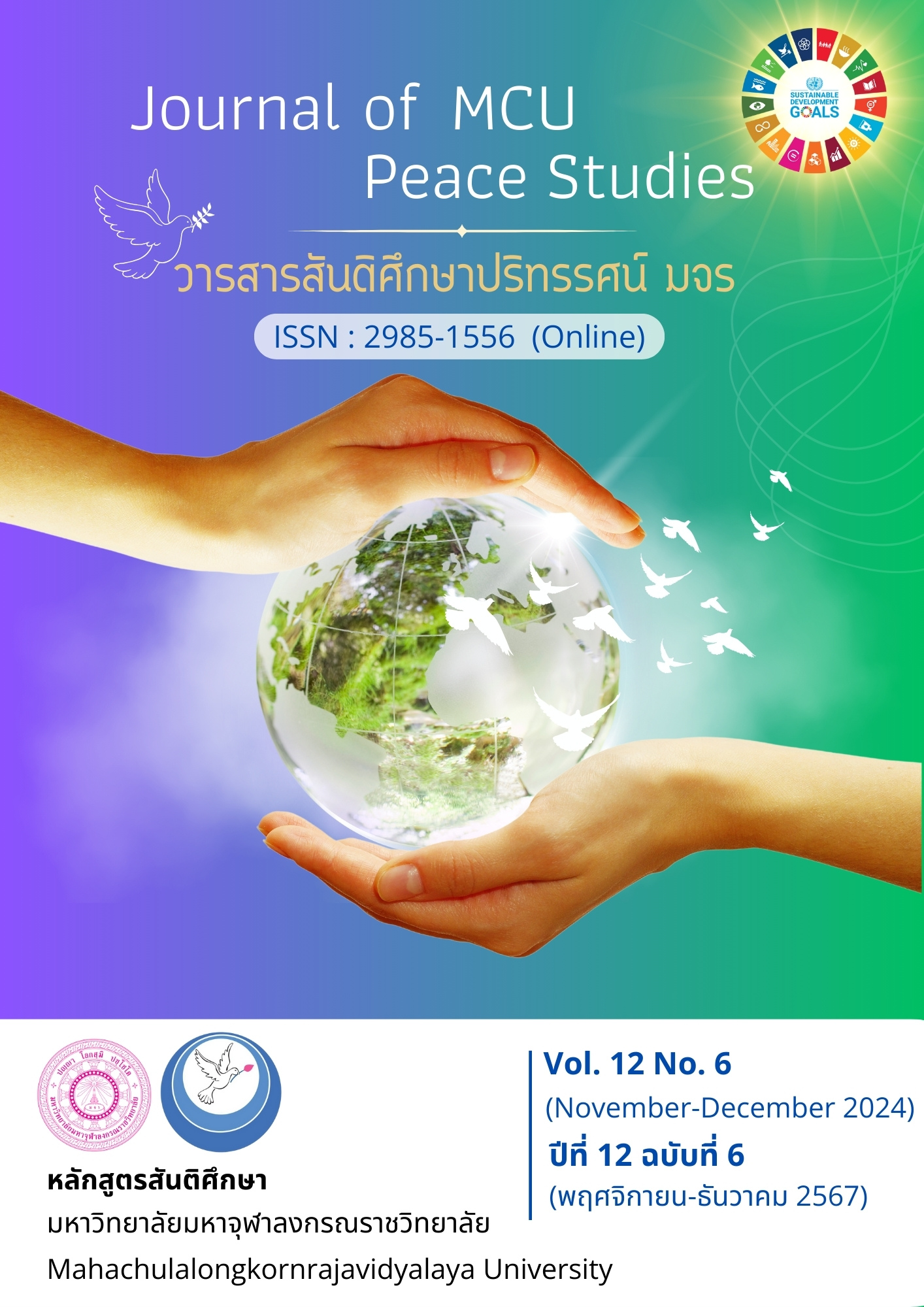โมเดลสมการโครงสร้างภาวะผู้นำเชิงจิตวิญญาณตามหลักพุทธธรรมของพระสอนศีลธรรม
Main Article Content
บทคัดย่อ
บทความนี้เป็นส่วนหนึ่งของงานวิจัยเรื่อง “โมเดลสมการโครงสร้างภาวะผู้นำเชิงจิตวิญญาณตามหลักพุทธธรรมของพระสอนศีลธรรม” มีวัตถุประสงค์ 1) เพื่อศึกษาองค์ประกอบโมเดลสมการโครงสร้างภาวะผู้นำเชิงจิตวิญญาณตามหลักพุทธธรรมของพระสอนศีลธรรม 2) เพื่อพัฒนาและตรวจสอบความตรงของโมเดลสมการโครงสร้างภาวะผู้นำเชิงจิตวิญญาณตามหลักพุทธธรรมของพระสอนศีลธรรม และ 3) เพื่อประเมินโมเดลสมการโครงสร้างภาวะผู้นำเชิงจิตวิญญาณตามหลักพุทธธรรมของพระสอนศีลธรรม ใช้วิธีการวิจัยเชิงปริมาณเพื่อขยายผลวิธีการวิจัยเชิงคุณภาพ วิเคราะห์สหสัมพันธ์เพียร์สัน วิเคราะห์เพื่อตรวจสอบความสอดคล้องของโมเดลกับข้อมูลเชิงประจักษ์ และวิเคราะห์ขนาดอิทธิพลทางตรงและทางอ้อมด้วยโปรแกรม LISREL กลุ่มตัวอย่างที่ใช้ในการวิจัย จำนวน 390 รูป/ คน
ผลการวิจัยพบว่า 1) องค์ประกอบโมเดลสมการโครงสร้างภาวะผู้นำเชิงจิตวิญญาณตามหลักพุทธธรรมของพระสอนศีลธรรม ได้แก่ คุณลักษณะพระสอนศีลธรรมที่พึงประสงค์, วิธีการพัฒนาภาวะผู้นำ, ไตรสิกขา และภาวะผู้นำเชิงจิตวิญญาณตามหลักพุทธธรรมของพระสอนศีลธรรม 2) โมเดลความสัมพันธ์เชิงสาเหตุ มีความสอดคล้องกลมกลืนกับข้อมูลเชิงประจักษ์ (Chi-square = 45.23, df = 35, p = 0.1154, GFI = 0.986, AGFI = 0.944, RMR = 0.0196) และ 3) การประเมินโมเดลสมการโครงสร้างภาวะผู้นำเชิงจิตวิญญาณตามหลักพุทธธรรมของพระสอนศีลธรรม ผลการตรวจสอบพบว่า มีความเหมาะสม มีความถูกต้อง มีความเป็นไปได้ในการปฏิบัติ และสามารถนำไปใช้ประโยชน์ได้ และสรุปองค์ความรู้จากการวิจัยมาพัฒนาเป็นโมเดลสมการโครงสร้างภาวะผู้นำเชิงจิตวิญญาณตามหลักพุทธธรรมของพระสอนศีลธรรม ได้เป็น MONK Model เพื่อให้ง่ายต่อการนำไปปรับใช้ได้จริงของพระสอนศีลธรรม
Article Details

อนุญาตภายใต้เงื่อนไข Creative Commons Attribution-NonCommercial-NoDerivatives 4.0 International License.
ทัศนะและความคิดเห็นที่ปรากฏในบทความในวารสาร ถือเป็นความรับผิดชอบของผู้เขียนบทความนั้น และไม่ถือเป็นทัศนะและความรับผิดชอบของกองบรรณาธิการ ยินยอมว่าบทความเป็นลิขสิทธิ์ของวารสาร
เอกสารอ้างอิง
Chantrawutikorn, S. (2019). The Study and Development of Training Model according to the Threefold Training to Strengthen Ethical Leadership for the Executive Officers and the Team Leaders of an Organization. (Doctoral Dissertation). King Prajadhipok's Institute. Bangkok.
Hair Jr., J. F., Anderson, R. E., Tatham, R. L., & Black, W. C. (1998). Multivariate Data Analysis. (5th ed.). Upper Saddle River, NJ: Prentice Hall.
Office of the Education Council. (2017). The National Education Plan (2017-2036). Bangkok: Prikwarn Graphic Co.,Ltd.
Phramaha Somsak Sriboriboon. (2008). The Study of Strategies to Develop Monk-Teacher’s Instructional Competencies in Secondary School under Office of the Basic Education Commission in Bangkok Region. (Master’s Thesis). Srinakharinwirot University. Bangkok.
Phrapalad Preecha Nandako (Chuanchuea). (2017). A Study on the Ways of Potential Development of Morality Teaching Monks in Secondary Schools in Rayong Province. (Doctoral Dissertation). Mahachulalongkornrajavidyalaya University. Ayutthaya.
Poolpatarachewin, C. et al. (2006). Research and Development of Processes for Creating Goodness and Morality. Bangkok: Office of Knowledge Management and Development (Public Organization).
The Office of Monk Development for Teaching Morality. (2007). Handbook of Teaching Morality Budget for Fiscal Year 2017. Nonthaburi: Chen Printing co., ltd.
______. (2016). Master Plan in the Office of Monk Development for Teaching Morality 5 Year Period (2017-2021). Bangkok: Chen Printing Limited Partnership.
______. (2015). Strategies Plan for Teacher-monk During the University Development Plan, Phase 11 (2012-2016). Nonthaburi: Chen Printing co., ltd.
Thompson, S. (2013). Hidden Strength: Encouraging Spiritual Leadership Attributes among School Leaders. Kentucky Journal of Excellence in College Teaching and Learning, 10(9), 107-108.
Tippayanate, K. (2013). A Structural Equation Medel of Spiritual Leadership for Basic School Administrators. (Doctoral Dissertation). Khon Kaen University. Khon Kaen.


